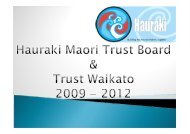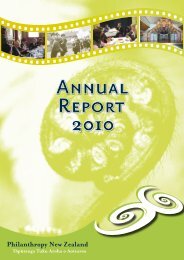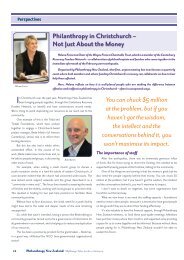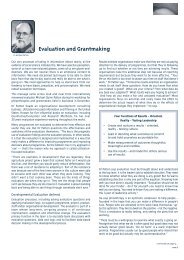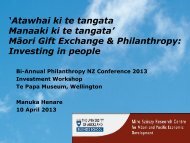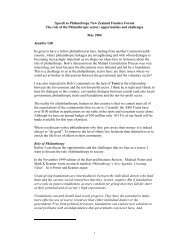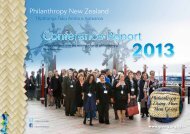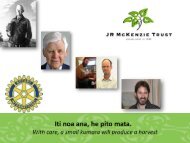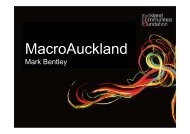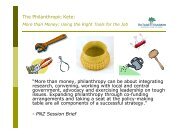Read our Conference Report online. - Philanthropy New Zealand
Read our Conference Report online. - Philanthropy New Zealand
Read our Conference Report online. - Philanthropy New Zealand
Create successful ePaper yourself
Turn your PDF publications into a flip-book with our unique Google optimized e-Paper software.
speakers“Treating people with unconditional respect,<br />
does actually work.”<br />
Sir Stephen Tindall from The Tindall Foundation<br />
“They inspire me every day to do all that’s in my<br />
power to offer them the opportunities and safety<br />
net that I had and that every child deserves.”<br />
Emily Tow Jackson, from the Tow Foundation, USA<br />
Emily Tow Jackson<br />
Emily spoke powerfully about how today’s generation of philanthropists want to lead social<br />
change, not just write cheques, and that small organisations have the power to achieve this.<br />
Under her leadership, her own family’s Tow Foundation – inspired by the case of brutally jailed<br />
teenager “Emily J” – made the leap into catalytic philanthropy and ultimately led to the successful<br />
transformation of Connecticut’s entire justice system.<br />
“If we were going to not just help 15 or 50 people but whole<br />
communities, we needed to do things differently.”<br />
The board began collaborating with non-profit leaders, government and advocates for legislative<br />
change. Two decades later, thousands of youths receive quality therapeutic care instead of being<br />
jailed and Emily is working to replicate the transformation in <strong>New</strong> York.<br />
“We are not a big organisation, but we have managed to deliver a catalytic impact by being bold,”<br />
said Emily, urging Kiwi grantmakers to do the same.<br />
<strong>Read</strong> Emily’s personal story of how her passion for working with youth began<br />
in <strong>New</strong> <strong>Zealand</strong>, HERE<br />
Hear her on Nine to Noon, HERE<br />
Watch her presentation, HERE<br />
Stephen Tindall<br />
Sir Stephen Tindall spoke about the Tindall Foundation’s move from “pure charity” to deeper work<br />
bringing social change in recent years.<br />
Such projects include growing community foundations, training and employing more Maori<br />
and Pacific people in South Auckland’s health sector and connecting young people to relevant<br />
qualifications and available jobs. Collaboration with others – government and communities – is<br />
key, Sir Stephen said.<br />
“We can’t do it alone. The government can’t do it alone.<br />
It’s about joining <strong>our</strong>selves up and trying to solve problems<br />
that actually exist in this country.”<br />
What has The Tindall Foundation learned?<br />
• Remain flexible, but stick to y<strong>our</strong> road map.<br />
• Be engaged but you are a funder, not a friend.<br />
• Use steering groups and advisory panels. “This works a treat”<br />
with round table discussions of interested parties getting things moving.<br />
• Look for an appetite for change within communities.<br />
• A warm head, cool heart, hard nose and patience.<br />
Asked about the next generation, he suggests parents use the rule of thirds when supplying pocket<br />
money – spend a third, save a third and give a third away:<br />
“Teach kids that you are supposed to share y<strong>our</strong> income with others.”<br />
See Stephen’s presentation, HERE<br />
Hear Stephen’s Radio <strong>New</strong> <strong>Zealand</strong> interview, HERE<br />
“Absolutely standout.” Adrienne Thurston, Hugh Green Foundation, on Emily Tow Jackson<br />
4



